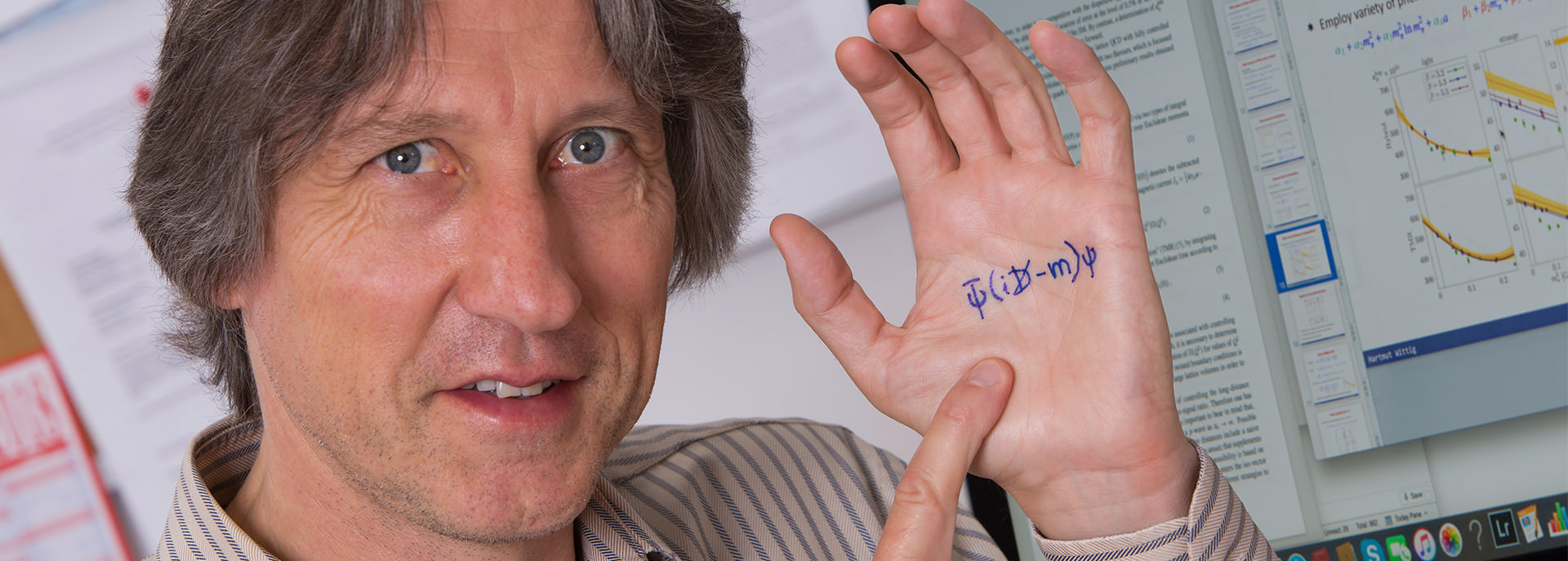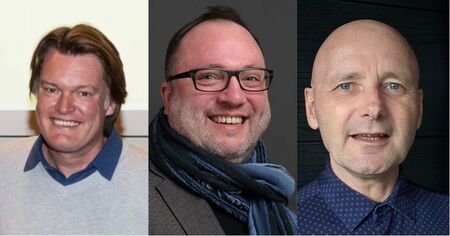Improved experimental precision to explore higher energy regimes
The theory of particle physics, the Standard Model (SM), successfully describes the basic constituents of matter and the forces that act between them. However, the astronomy of the universe at very large scales shows that the SM explains only about 15% of the total mass in the Universe. The present day understanding of particle physics at the smallest scales of nature must be extended by new, yet unknown forces and particles beyond the SM. This is where the project “Zeptometry” comes into play.
In the absence of direct observation of new particles at colliders like the LHC at CERN in Geneva, it becomes increasingly important to determine the parameters of the SM with the highest possible precision, since new particles and forces would change their values and the energy dependence through quantum effects. The existence of many of the most recently discovered SM particles was known long before their direct observation, from quantum corrections to precision measurements at high energies: prominent examples include the W and Z bosons, the top quark, the tau neutrino and, most recently, the Higgs boson.
The project “Zeptometry” will combine data from the LHC, the very high energy accelerator operating at CERN, with the low-energy data from P2 at MESA in an innovative and interdisciplinary approach. “This ERC advanced grant emphasizes the impact of the extremely challenging measurements of the P2-experiment at the new high intensity electron accelerator MESA on the campus of JGU Mainz. The combination with the LHC data will probe the existence of new particles down to microscopic length scales of a zeptometer (10-21 m)”, explains Prof. Maas. “Dedicated theoretical developments will also be performed in Mainz, allowing an optimal interpretation of the results. The combination of results from extreme energy ranges, from distinct research areas, and otherwise independent experimental and theoretical communities is new and innovative. It will help to evaluate the options for future collider projects.”
The ERC Advanced Grant strengthens the collaboration between Saclay and Mainz
ERC Advanced Grants are awarded to outstanding researchers to enable them to work on projects considered to be highly speculative due to their innovative approach, but which, because of this, can open up access to new approaches in the corresponding research field. Only researchers who have already made significant breakthroughs and have been successfully working for at least ten years at the highest levels of international research are eligible for the grant. The only criteria considered in awarding ERC funding are the academic excellence of the researcher in question and the nature of their research project. An ERC grant thus also represents an important acknowledgement of the recipient's achievements.
Prof. Dr. Maarten Boonekamp, Particle Physics division of the Institute of Research into the Fundamental Laws of the Universe (IRFU), leads the team which studies the properties of W and Z bosons with the ATLAS detector at the LHC. He is an expert in the phenomenology of the Standard Model and in the calibration of the calorimeters and charged particle detectors composing the ATLAS experiment. He was a visiting scientist of the Helmholtz Institut Mainz, a GSI branch, and of the PRISMA+ Custer of Excellence from 1 September 2021 to 31 August 2023. He is also a member of the P2-experiment collaboration.
Prof. Dr. Frank Maas is the originator and the spokesperson of the P2-experiment, currently under construction at the MESA accelerator on the campus of JGU Mainz. Since 2007, he is leading scientist at the GSI Helmholtzzentrum für Schwerionenforschung Darmstadt and full professor at JGU, where he is a principal investigator at the PRISMA+ Cluster of Excellence in Mainz. He acted for 10 years as the founding director of the Helmholtz Institute Mainz (HIM). As the project leader of the P2 experiment at MESA he spearheaded the preparatory research and development for the P2-concept and detectors in the framework of the PRISMA+ Cluster of Excellence.
Prof. Dr. Jens Erler is a world expert in the phenomenology and theoretical interpretation of precision experiments. He is editor of the corresponding chapter on weak interactions in the Particle Data Group (PDG). Coming from the leading university UNAM in Mexico, he was appointed a PRISMA professorship in “Precision Calculations for Low-Energy Experiments” in January 2021, after several years of collaboration with colleagues in Mainz. He works mainly on the theoretical basis for the interpretation of P2 experimental results.
The P2 experiment is funded in the framework of the German “large installations” funds (Großgeräte). Additional development work for P2 has been funded by DFG and by the Helmholtz-Association in the framework of the “Helmholtz Excellence Network”. The additional funding from “Zeptometry” will support the construction of the backward-scattering detector enhancing substantially the accuracy of the measurements.
Publications:
Becker, D., et al., The P2 experiment: A future high-precision measurement of the weak mixing angle at low momentum transfer. Eur. Phys. J. A 54, 208 (2018).
DOI: 10.1140/epja/i2018-12611-6
https://link.springer.com/article/10.1140/epja/i2018-12611-6
Berger, N., Denig, A., Maas, F., & Sfienti, C., Laboratory Portrait: The MESA Experimental Program: A Laboratory for Precision Physics with Electron Scattering at Low Energy. Nuclear Physics News, 31(3), 5–10 (2021).
DOI: 10.1080/10619127.2021.1954434
https://www.tandfonline.com/doi/full/10.1080/10619127.2021.1954434
Image:
download.uni-mainz.de/presse/08_prisma+_boonekamp_maas_erler.png
Prof. Dr. Maarten Boonekamp, Prof. Dr. Frank Maas, Prof. Dr. Jens Erler
photo/©: private/ Sabrina Hopp
Related links:
https://irfu.cea.fr/en/ – IRFU at Saclay
https://www.prisma.uni-mainz.de/ – PRISMA+ Cluster of Excellence at JGU
https://www.gsi.de/ – GSI Helmholtz Center for Heavy Ion Research
https://www.hi-mainz.de/ – Helmholtz Institute Mainz
erc.europa.eu/news-events/news/erc-2023-advanced-grants-results
Contact:
Prof. Dr. Frank Maas
PRISMA+ Cluster of Excellence/GSI/Helmholtz Institute Mainz (HIM)
Institute for Nuclear Physics
Johannes Gutenberg University Mainz
55099 Mainz, Germany
Email: maas@him.uni-mainz.de
https://www.kernphysik.uni-mainz.de/univ-prof-dr-frank-maas/
Prof. Dr. Jens Erler
PRISMA+ Cluster of Excellence
Institute for Nuclear Physics
Johannes Gutenberg University Mainz
55099 Mainz, Germany
Email: erler(at)uni-mainz.de



